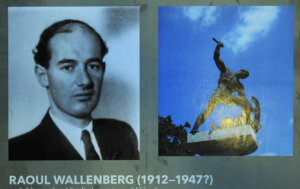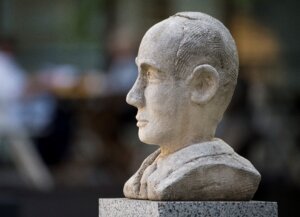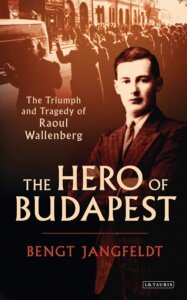Did ‘The Scarlet Pimpernel’ inspire Raoul Wallenberg’s Holocaust heroism?
Wallenberg saw an anti-Nazi remake about the superhero with a double life. ‘Pimpernel’ also inspired Stan Lee and Larry David

From left, Scarlet Pimpernel actors Leslie Howard and Merle Oberon; Raoul Wallenberg’s half-sister Nina Lagergren with a photo of him. Photo by Nextrecord Archives/Getty Images (Pimpernel); Jonathan Nackstrand/AFP via Getty Images (Lagergren)
When a historian told me that The Scarlet Pimpernel inspired famed Holocaust rescuer Raoul Wallenberg, I was intrigued — but skeptical.
The Scarlet Pimpernel is the fictional tale of a foppish English nobleman who leads a double life saving aristocrats from the guillotine during the French Revolution. The definitive film version of the story came out 90 years ago, in 1934.
But it was remade in 1941 as an anti-Nazi propaganda film. The reboot, Pimpernel Smith, featured an eccentric archaeology professor who goes to Nazi Germany on a dig to explore Aryan culture. His real mission: rescuing concentration camp prisoners.
It turns out that remake is widely cited as the catalyst for Wallenberg’s courage. His half-sister, Nina Lagergren, told the BBC and a Wallenberg biographer that after watching Pimpernel Smith, Wallenberg said: “That is something I would like to do.”
Digging into the story, I found other Jewish connections. Scarlet Pimpernel producer Alexander Korda was a Hungarian Jew. The star of both movies, Leslie Howard, was a British actor (née Steiner), son of a Hungarian Jew.
I found Jewish pop culture links, too. Marvel Comics’ famed Jewish editor, Stan Lee, called Pimpernel the world’s first superhero because of the character’s secret identity. Jewish comedian Larry David quoted a poem from the story in an episode of Curb Your Enthusiasm. And a Daffy Duck spoof called The Scarlet Pumpernickel featured kreplach priced at $1,000 each.
Here’s a look at the history of The Scarlet Pimpernel and its quirky Jewish afterlives.
The story, the play, the movies
The Scarlet Pimpernel originated as a short story by Emma Orczy, a Hungarian-born British writer and baroness. She and her husband turned the tale into a hit play that premiered in London in 1903 and ran for four years. Orczy also wrote a bestselling novel with the same title. (A pimpernel is a small roadside flower; Orczy’s hero used a red one in place of his signature.)
Orczy’s original story was full of antisemitic tropes, but the 1934 movie eliminated those references. (How could it not, with a Jewish producer and leading man?) The film was well received and cemented Leslie Howard’s reputation as a box-office draw. He went on to play Ashley Wilkes in Gone With the Wind and earned two Oscar nominations for other films.
But with Hitler’s army steamrolling through Europe, Howard left Hollywood to help the war effort. Back in England, he started making anti-Nazi propaganda films, including Pimpernel Smith. Howard’s character outwitted and intimidated every Nazi he met — just as Wallenberg would do in real life.
Wallenberg’s derring-do
Pimpernel Smith was banned in Sweden for fear that it might jeopardize Sweden’s official stance of neutrality in World War II. Wallenberg, the scion of two wealthy Swedish families, saw the film at a private screening at the British Embassy in Stockholm in 1942.

Two years later, as a Swedish diplomat running the U.S. War Refugee Board in Budapest, Wallenberg dwarfed Pimpernel Smith’s exploits: Where Howard freed a handful of people, Wallenberg rescued tens of thousands.
“The War Refugee Board didn’t want to hire him because he had no experience, but nobody else wanted the job,” said Eric Saul, the historian who put me on to the Pimpernel connection. Saul is also the founder of Visas for Life, which honors diplomatic efforts to rescue Jews. Wallenberg, he said, “arrived with a rusty pistol and thousands of dollars strapped to his body to bribe Nazi officials, and he was just thrown into the lion’s den.”
Between July 1944 and January 1945, Wallenberg carried out what the U.S. Holocaust Memorial Museum deemed one of the Holocaust’s “most extensive and successful rescue efforts.”
Wallenberg saved Jews from deportation by providing them with legal papers, jobs and safe houses; he used bribery and blackmail, and he even persuaded a Nazi official to release 200 Jews from a cattle car. He confronted and threatened anyone in his way, at one point telling Hungarian fascists pulling Jews from a building he’d rented in the Swedish government’s name: “This is Swedish territory … If you want to take them, you’ll have to shoot me first.”
Pimpernel in pop culture
The story of an ordinary person with a secret identity as a crusader for justice is a cliche in pop culture. But none other than Stan Lee, the Jewish editor of Marvel Comics, cited The Scarlet Pimpernel as the “first legitimate superhero movie.” In a 2018 videotaped interview, Lee said the protagonist “wore a disguise, but it wasn’t a mask or anything like that. He just didn’t let people know who he really was.” Lee co-created many of Marvel’s biggest superheroes, including Spider-Man, Thor, X Men, Black Panther and The Hulk.
Who was the first hero you were introduced to? In his latest video, Stan talks about the very first superhero he read about and was inspired by. #FlashbackFriday pic.twitter.com/N4yLyXBycy
— Stan Lee (@TheRealStanLee) September 7, 2018

Another Jewish-themed link to Pimpernel, Looney Tunes’ 1950 Scarlet Pumpernickel, featured Daffy Duck (voiced by the Jewish actor Mel Blanc) pitching a movie to Warner Bros. Daffy’s convoluted pitch included a subplot about skyrocketing inflation exemplified by a sign selling kreplach for $1,000 each.
A more recent Pimpernel allusion popped up in the 2012 Curb Your Enthusiasm episode “Palestinian Chicken.” As Larry David struts out of the bedroom after hot sex with a gorgeous Palestinian woman, he begins reciting a slightly altered version of Pimpernel’s signature poem: “We seek him here, we seek him there, those Frenchies seek him everywhere. Is he in heaven? Is he in hell? That damned elusive Pimpernel!”
Perplexed Curb fans too young to recognize the reference sought explanations on Reddit. Explained one commenter: “The Pimpernel leads a double life and operates in secret, which probably chimes with Larry sleeping with the Palestinian woman.” Another wrote, “In the movies he was also a suave ladies man, I took it as Larry living a double life while enjoying some booty.”
When my Forward colleague Louis Keene did a deep dive into “Palestinian Chicken” — said to be David’s all-time favorite Curb episode — producers told him David had rewatched The Scarlet Pimpernel the night before filming the episode.
Howard and Wallenberg: Tragic and mysterious fates
In the final scene of Pimpernel Smith, the professor appears to be doomed, giving himself up to a Nazi general in exchange for a woman’s freedom. Of course, at the last minute, he outsmarts his nemesis and escapes.
In real life, neither Howard nor Wallenberg were so lucky. Howard died in 1943 when the Luftwaffe shot down the plane he was on. The attack violated protocols against striking civilian aircraft. Howard’s son and others believed the plane was targeted because of Howard’s antifascist activism. The wreckage was never found.
Wallenberg also met a tragic and mysterious fate. He was taken prisoner in January 1945 by the Soviets during their occupation of Hungary and never heard from again. Other former Soviet prisoners claimed to have seen him in the gulag over the years, but those reports were never substantiated.

Eventually Soviet officials claimed Wallenberg died in prison in 1947. But why he was arrested in the first place has never been fully explained. Was it a mistake, or did the Soviets view him as a threat or a spy?
Wallenberg’s family spent their lives and their fortunes searching for answers. False leads and stonewalling by Russian, Swedish and U.S. authorities during the Cold War only deepened the mystery.
“The world abandoned the family, and abandoned him, for reasons that are inexplicable,” said Saul. “One of the reasons I’m so devoted to the study of diplomatic rescue is because of people like Raoul Wallenberg who risked everything.”
Yad Vashem, Israel’s memorial to the Holocaust, recognized Wallenberg as Righteous Among the Nations in 1963. Wallenberg’s mother asked the organization to refrain from planting a tree in his honor until after she died; she believed her son might some day return.
In 1979, she and her husband died by suicide, two days apart. Yad Vashem planted the tree later that year.
Did life really imitate art?
Could Wallenberg’s bravado, compassion and ingenuity truly have stemmed from merely watching a movie?

A 2009 Wall Street Journal story suggested that the seed for his activism was planted well before the film, when, on a 1936 business trip to Haifa, he stayed in a kosher boarding house and met a German Jew whose brother was murdered by the Nazis.
Wallenberg also had a Jewish great-great-grandfather. According to a 2014 biography, The Hero of Budapest, as a teenager, he once told a friend: “A person like me, who is both a Wallenberg and half-Jewish, can never be defeated.”
The case for Pimpernel Smith’s impact is further muddied by conflicting statements from Wallenberg’s half-sister. She’s the one who originally cited the movie as sparking her brother’s activism. In 2009, she backtracked, telling Richard Raskin, a professor at Denmark’s University of Aarhus, that it was “not the case that seeing Pimpernel Smith” inspired Wallenberg.
Yet Raskin was not dissuaded. “The remarkable rescue of countless lives in Budapest involved at least in part the transmission of a heroic model from Leslie Howard to Raoul Wallenberg,” Raskin wrote in an academic journal article. ”There is every reason to believe that once committed to his mission at the Swedish legation in Hungary, Wallenberg found in Pimpernel Smith a role-model he could adapt to the situation at hand.”




















